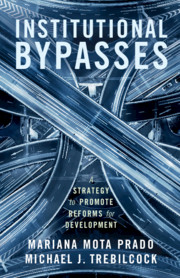Crossref Citations
This Book has been
cited by the following publications. This list is generated based on data provided by Crossref.
Rosevear, Evan
Trebilcock, Michael
and
Mota Prado, Mariana
2021.
The New Progressivism and its implications for institutional theories of development.
Development Policy Review,
Vol. 39,
Issue. 4,
p.
644.
Pue, Kristen
Westlake, Daniel
and
Jansen, Alix
2021.
Does the Profit Motive Matter? COVID-19 Prevention and Management in Ontario Long-Term-Care Homes.
Canadian Public Policy,
Vol. 47,
Issue. 3,
p.
421.
Trebilcock, Michael
2022.
The Good Governance Quandary: The Elusive Search for Role Models.
Law and Development Review,
Vol. 15,
Issue. 1,
p.
105.
Gillis, Rory
2023.
Rethinking the division of tax room and revenue in fiscal federalism.
University of Toronto Law Journal,
Vol. 73,
Issue. 2,
p.
174.
De Lara, Gustavo Dalpupo
and
De Chueiri, Vera Karam
2023.
RAMO RECONSTRUTIVO, MINICONSTITUIÇÕES E BYPASSES INSTITUCIONAIS:.
REI - REVISTA ESTUDOS INSTITUCIONAIS,
Vol. 9,
Issue. 1,
p.
241.
RICH, JESSICA A. J.
2023.
Outsourcing Bureaucracy to Evade Accountability: How Public Servants Build Shadow State Capacity.
American Political Science Review,
Vol. 117,
Issue. 3,
p.
835.
Szpak, Agnieszka
and
Piechowicz, Michał
2023.
Cities as a Transnational Institutional Bypass of Nation-States.
Polish Political Science Review,
Vol. 11,
Issue. 1,
p.
86.
Julia Maia Goldani
2024.
How Democratic Police Reforms Fail: A Law and Development Perspective on Institutional Processes of Change and Resistance.
Law and Development Review,
Vol. 0,
Issue. 0,
Bonnitcha, Jonathan
and
Williams, Zoe Phillips
2024.
The impact of investment treaties on domestic governance in developing countries.
Law & Policy,
Vol. 46,
Issue. 2,
p.
140.





